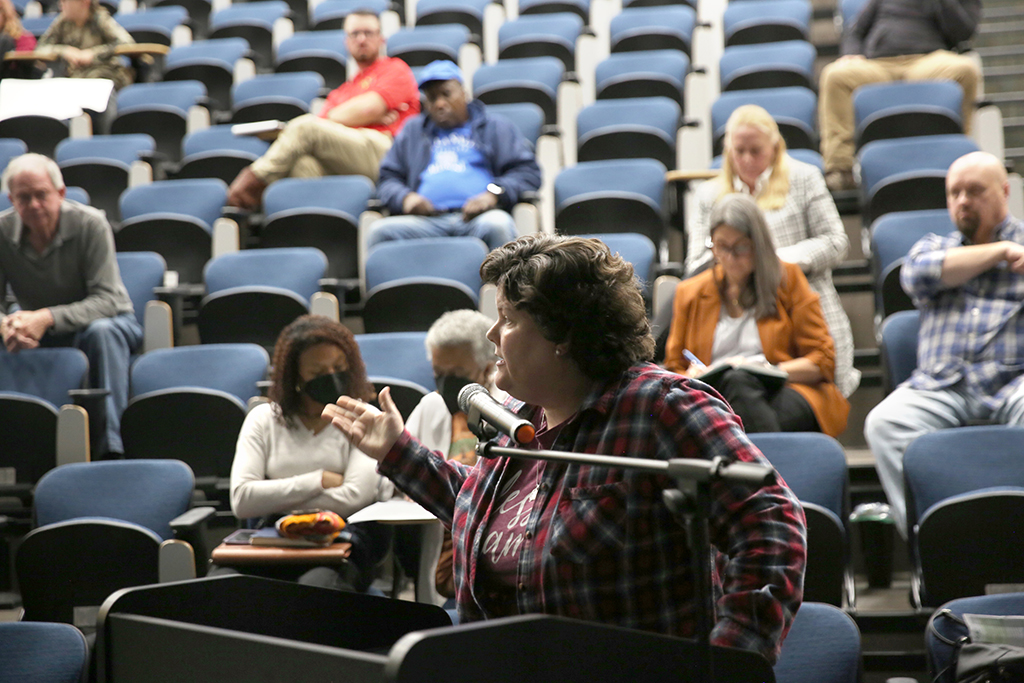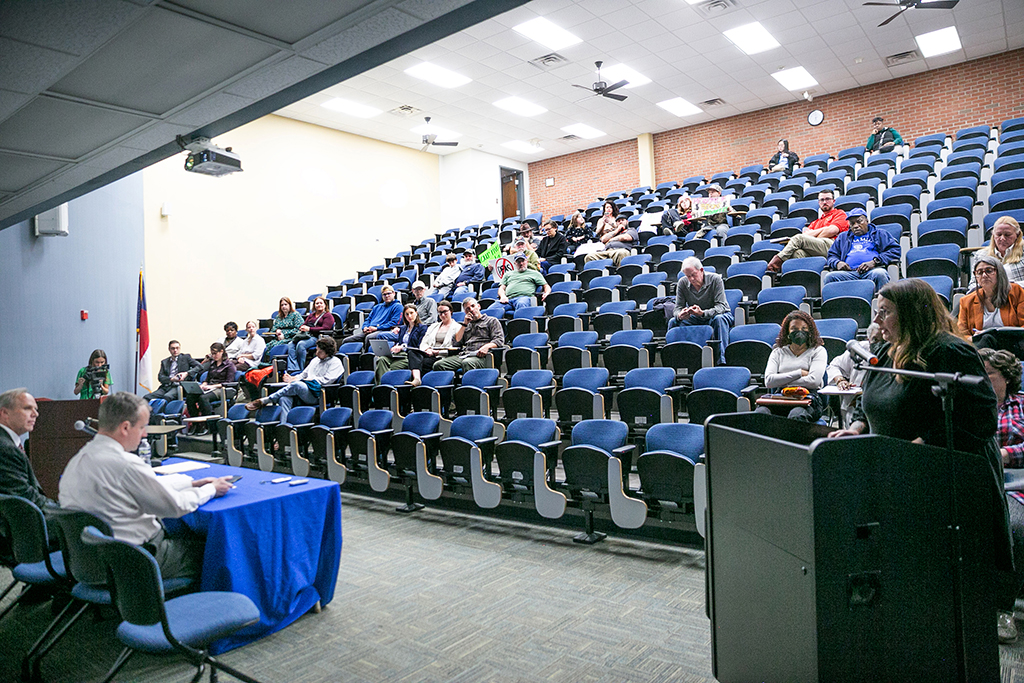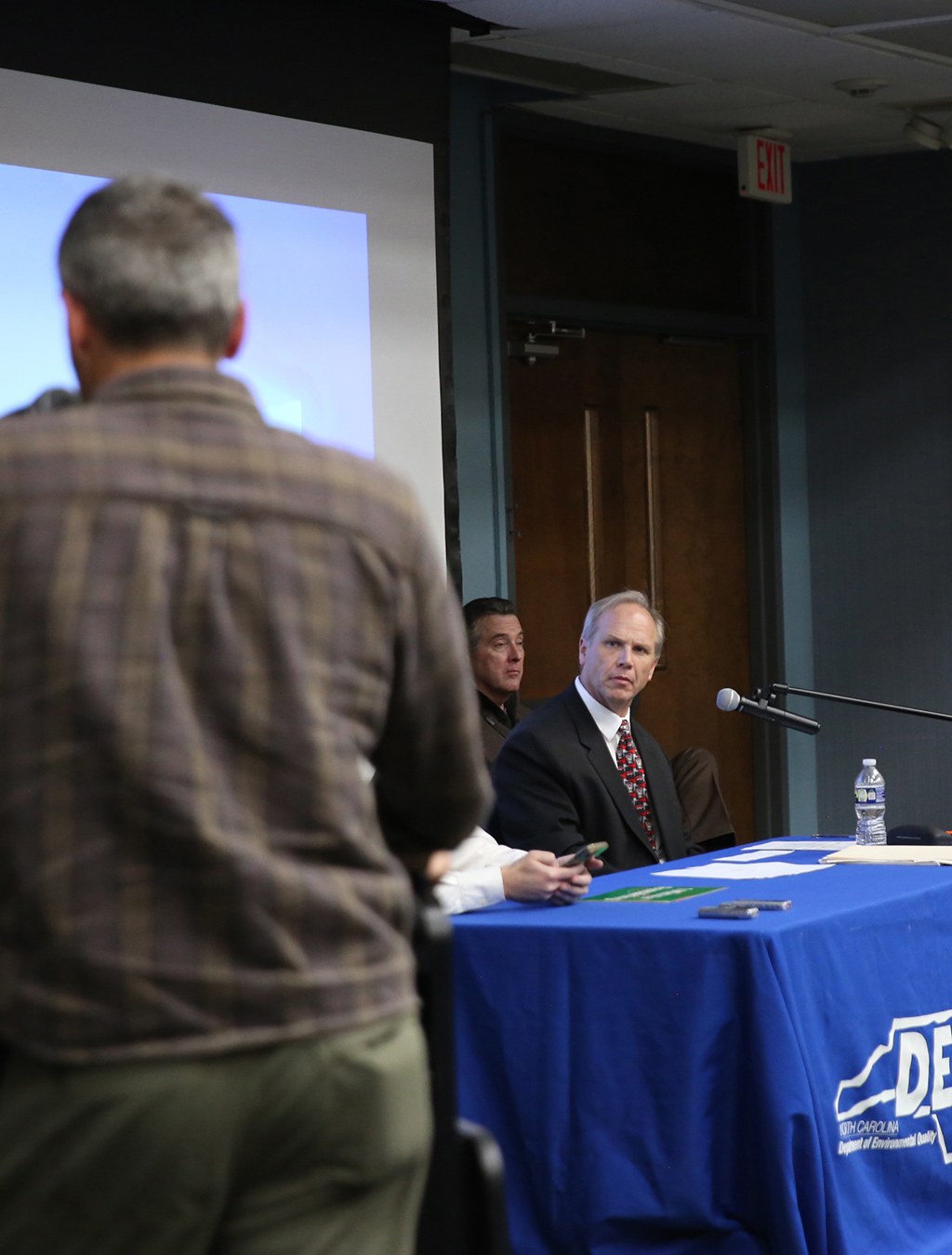KENANSVILLE — Approximately 45 people gathered at the Monk Auditorium in Kenansville on Dec. 17 to participate in the NC Department of Environmental Quality public comment session.
The meeting addressed Lear Corporation’s latest draft permit regulating PFAS compounds — a dangerous class of toxic chemicals — discharges into the Northeast Cape Fear River.

Speakers like Jessica Thomas and Christine Goldsmith expressed concern for their families who live, swim, and fish downstream of the facility.
Recent tests on samples collected from Thomas’ backyard revealed alarmingly high toxicity levels in the largemouth bass and bluegill near the Sarecta Bridge. Thomas shared that for several months now, she has reached out to county officials and area representatives to make them aware. Thomas shared that meaningful responses have been disappointingly absent despite her persistent efforts, leaving the community at risk.
As a mother of three boys, aged 8, 10, and 12, she struggled to hold back tears while reflecting on the countless hours they have spent swimming and fishing in waters they, for years, believed to be safe.
“It wasn’t until this summer that I learned that PFAS can be absorbed through the skin. Not only can they be absorbed through the skin, but you get most of the contamination that way,” said Thomas. She thanked DEQ for providing a platform to be heard and asked for the new permit to require the company to remove “forever chemicals” before discharging into the river.
“These companies and agencies have known for decades about the harm they cause, yet it’s allowed to continue. Why is this issue being ignored in Duplin County?” She asked, demanding accountability. “You have in your presentation that Lear claims to have stopped using PFOA and PFAS 16 years ago. But those same chemicals are showing up in my backyard, in the water and in the fish.”

Goldsmith, whose family lives on Sarecta Road, also expressed her concerns about why residents living nearby were not directly notified; she only learned about the meeting casually a day prior.
“I’m disgusted that no one from Duplin County is here representing… where are our representatives here at this meeting tonight?” said Goldsmith, adding that a mailer should have been sent out to everyone who lives close to the river to let them know.
“I didn’t know anything about it. This is not a Republican or a Democrat issue. This is a human being issue regarding our children. I’m not comfortable with my grandchildren fishing out of the Cape Fear River. How have we gotten to this point that money is more important than our children… Will they ever know what it’s like to fish out of the Cape Fear River and cook a fish on the fire and not have to be worried about chemicals that might kill them? That’s my question to everyone here tonight,” said Goldsmith. “It shouldn’t take until 2029 or 2027 or whenever to test for these chemicals. Do the right thing now.”
An attorney with the Southern Environmental Law Center noted that the revised draft permit does not require Lear to implement best practices to protect the people, emphasizing that there was still time for DEQ to revisit its draft using the tools in the Clean Water Act to control PFAS.
Kasey Moraveck, also an attorney with the Southern Environmental Law Center, expressed that while the studies and monitoring required in Lear’s draft permit sound nice, they don’t safeguard public health.
“You have known for five years that Lear is discharging harmful chemicals every day into the water that downstream communities rely on for fishing and swimming,” said Moraveck, noting that DEQ has been aware of the discharges since 2019. “Instead of acting affirmatively with this draft permit, you are knowingly subjecting these communities to PFAS for at least five more years.”
Moraveck expressed her frustration with the lack of decisive action. “Despite having five years to prepare for this permit renewal, you claim that you need more information to set technology-based effluent limits,” said Moraveck. “DEQ can apply technology’s known removal efficiency to Lear’s PFAS data. From these results, limits can be calculated in accordance with EPA permitting guidelines.”
Moraveck emphasized that the process is straightforward and can be accomplished using basic statistical methods. She also noted that the draft permit’s re-opener does not protect downstream communities from ongoing contamination.
“DEQ has never re-opened a permit to address toxic pollution, we have no reason to trust that you will do it here,” said Moraveck.
Kemp Burdette, Cape Fear River Watch’s Riverkeeper who initially discovered the toxic discharges, was among the speakers.
“Lear has acknowledged that they discharge two especially dangerous PFAS compounds, PFOA and PFOS, at levels 7,550 times and 1,470 times above the EPA health advisory level, respectively. In the last five years, Lear has violated their permit 48 times,” said Burdette, emphasizing that’s only the times they got caught.
He noted that largemouth bass he harvested near the Sarecta bridge had 20 times higher levels of PFAS in their tissue than the fish the state tested in Bladen County and deemed unsafe to consume, adding that bluegill had levels that were 12 times higher.
“I used the same process and the same certified lab that the state used to issue their consumption advisory,” said Burdette.

He expressed disappointment that despite sharing the lab results about the toxic fish, no action has been taken to stop the discharges.
“We know that people fish in the river downstream of Lear, and that people should be able to fish downstream of Lear and bring those fish home to put on the table for a healthy meal for their families. But they can’t because Lear discharges PFAS into the river,” said Burdette. “We know the EPA sent a letter to DEQ that said, ‘EPA Region 4 has determined that the draft permit — this draft permit — does not adequately protect the health of the public or aquatic environment affected by these discharges.’”
A final decision about the draft permit will be made in 90 days. Persons who were unable to attend the session can mail comments to Fenton Brown Jr., NPDES Wastewater Permitting, Attn: Lear Corporation Permit, 1617 Mail Service Center, Raleigh, N.C., 27699-1617 or via email to publiccomments@deq.nc.gov and should include Lear Corporation Permit in the email subject line. DEQ will accept comments from the public until Friday, Jan. 10.
 Twitter
Twitter Facebook
Facebook Instagram
Instagram





